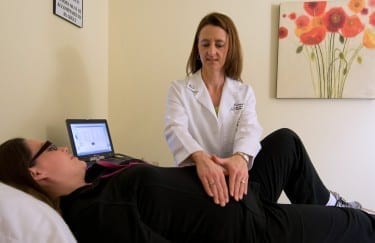A terrific team: DMU physical therapy clinicians include Libby Trausch, Sharon Johansen, Kari Smith, Shane McClinton, Traci Bush, Michelle Brown, Kathy Mercuris and Shannon Petersen, with patient services representative Fran Allen.
When the city of Des Moines in 2009 switched its occupational health services provider from the DMU Clinic to another entity, the DMU Physical Therapy Clinic lost its main source of referrals. Given the clinic is not affiliated with a large hospital to make up the difference, its clinicians faced a decision.
“Did we want to cut our staff, or did we want to build up our team to expand our practice?” reflects Kari Smith, D.P.T.’04, M.S.P.T.’98, BCB-PMD, who became clinic manager in 2005. “It was an opportunity for us to identify what services we wanted to offer and what kinds of patients we wanted to serve.”
Facing a decision on its future, the DMU Physical Therapy Clinic chose to make it bright. Its staff have expanded their expertise and services into niche areas, offer community education programs, use social media, distribute a newsletter and take time to truly get to know and serve their patients.
In deciding the direction for the DMU Physical Therapy Clinic, Smith and her colleagues embraced gaining additional training to diversify into niche services. In recent years, examples include these efforts:
- Smith and Libby Trausch, D.P.T.’08, completed three advanced training courses on the treatment of pelvic floor dysfunction for women, men and children. They both have passed the American Physical Therapy Association (APTA) certification process in pelvic physical therapy.
- After completing board certification in biofeedback for pelvic muscle dysfunction through the Biofeedback Certification International Alliance last year, Smith now is the only physical therapist in Iowa with this credential.
- Clinicians and faculty Shannon Petersen, P.T., D.Sc.P.T., OCS, FAAOMPT, COMT, and Kathy Mercuris, P.T., D.H.S., became certified instructors in tai chi for arthritis. Mercuris also has certifications in neurodevelopment treatment (NDT) for adults with hemiplegia and exercise for older adults (CEEAA).
- Petersen and Shane McClinton, D.P.T.’07, M.S.P.T.’01, OCS, FAAOMPT, CSCS, both have completed fellowship training in orthopedic manual physical therapy.
- McClinton also leads DMU’s Running and Cycling Clinic, which combines clinical expertise with the Human Performance Lab to analyze, evaluate and recommend therapies and adjustments to help athletes minimize or avoid pain and injury and improve performance. Last fall McClinton completed initial training in trigger point dry needling (TDN), a technique for deactivating or shutting down painful or knotted areas in the muscles.
- The DMU Physical Therapy Clinic is a certified provider of ASTYM treatment, which is evidence-based, regenerative soft tissue therapy that can quickly resolve tough musculoskeletal and scar tissue issues.
- The clinic has specialized in the treatment of vestibular dysfunction along with the prevention and treatment of falls with Mercuris and therapist Michelle Brown, M.S.P.T.’99.

In addition to all those accomplishments, the University’s physical therapists have relentlessly pursued community education opportunities to benefit patients and promote their services to referring physicians. “That fulfills DMU’s mission of providing education and serving the community,” Smith points out.
For example, she and Trausch present frequently on physical therapy’s role in addressing women’s health issues, including pregnancy and postpartum care, incontinence and pelvic pain. McClinton is an invited speaker for many sports-related topics in the community. For older adults, Mercuris and Brown have given presentations on preventing falls and improving balance, including what’s become a popular annual Fall Prevention Day event.
DMU’s physical therapists also offer an “Athletic Power Hour” series and Pilates sessions to improve core strength, among other topics. This year, the clinic will offer Pilates and yoga classes to past patients and other community members.
DMU physical therapy students participate in many of these service activities, including offering flexibility assessments and post-race stretching to participants in central Iowa athletic competitions; screenings at local retirement communities and during the Iowa State Fair; and hands-on therapies for stroke survivors at an annual weeklong DMU “stroke camp.”
“We have such hard-working clinicians. I’m most impressed with them not only because of their work ethic with day-to-day patients, but also with their willingness to pound the pavement to promote our services,” says Traci Bush, D.P.T., M.S.P.T.’95, OTR/L, D.H.S., chair and director of DMU’s physical therapy program and former Physical Therapy Clinic manager. “They continue to be experts in their respective areas while looking for additional training.”
Their efforts have reaped benefits for their patients and the University. Last fall, DMU Clinic administrators honored the Physical Therapy Clinic for an outstanding 2012-2013 fiscal year marked by an increased number of patient visits, a leap in net income, retention of “repeat” patients and expanded community education and service activities. The physical therapy department has engaged its faculty in the clinic, allowing patient numbers to increase without cutting individual appointment times short.
All of these efforts reflect the department’s commitment to patient care and student education.
“We’ve expanded to involve more students in our clinic. We’ve included osteopathic and podiatric medical students in a two-week elective rotation to promote our mutually beneficial relationship as care providers,” Smith says. “We want to continue providing the best possible care to a wide variety of conditions and to patients of all ages. We treat the spectrum from young children to baby boomers who want to remain active.”


